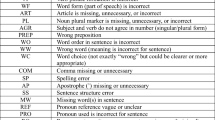Abstract
This chapter reports the findings from an exploratory study on Omani EFL errors at college level. It investigated the types, categorisation and sources of written errors that Omani EFL students (in foundation and first year at college level) commit by collecting students’ written samples. Findings showed that while foundation-year students committed more errors in lexical items, spelling and the majority of grammatical sub-categories, first-year students seemed to commit more errors in syntax and organisation due to the length of the texts they were required to write. Research findings should be disseminated to teachers to understand students’ learning progress and help teachers plan teaching activities. For future research, instead of collecting written samples from different groups of students, tracing errors committed by a panel group over a period of time would provide more valid and reliable data.
Access this chapter
Tax calculation will be finalised at checkout
Purchases are for personal use only
Similar content being viewed by others
References
AbiSamra, N. (2003). An analysis of errors in Arabic speakers’ English writings (Unpublished article). Retrieved on March 19, 2010, from http://nadabs.tripod.com/onlinematerials.htm#3.
Al-Hadrami, H. (2006). Mechanical writing errors in English. In S. Borg, Classroom research in English Language Teaching in Oman (pp. 1–7). Retrieved on August 18, 2010, from moe.gov.om.
Al-Hazmi, S., & Scholfield, P. (2007). Enforced revision with checklist and peer feedback in EFL writing: The example of Saudi university students. Scientific Journal of King Faisal University, 8(2), 237–267.
Bacha, N. (2002). Developing learners’ academic writing skills in higher education: A study for educational reform. Language & Education, 16(3), 161–177.
Badawi, E., Carter, M., & Gully, A. (2004). Modern written Arabic: A comprehensive grammar. London: Routledge.
Borg, S. (2006). (Ed). Classroom research in English language teaching in Oman. Muscat: Ministry of Education, Sultanate of Oman and Oriental Printing Press.
Cohen, A. (1975). Error correction and the training of language teachers. The Modern Language Journal, 59(8), 414–422.
Cohen, L., Manion, L., & Morrison, K. (2007). Research methods in education. London: Routledge.
Corder, S. (1981). Error analysis and interlanguage. Oxford: Oxford University Press.
Corder, S. (2008). Language teaching. Cambridge: Cambridge University Press.
Holes, C. (2004). Modern Arabic structures, functions, and varieties. Washington: Georgetown University Press.
Ibrahim, M. (1978). Patterns in spelling errors. ELT Journal, XXXII(3), 207–212.
Kharma, N., & Hajjaj, A. (1997). Errors in English among Arabic speakers: Analysis and remedy, York handbooks for teachers of English to Arab students. Beirut: York Press.
Ministry of Higher Education. (2009). The English programme. Retrieved on August 18, 2010, from http://www.cas.edu.om/index.php/academicprograms/english.
Rifkin, B., & Roberts, F. (1995). Error gravity: A critical review of research design. Language Learning, 45(3), 511–537.
Roach, P. (2009). English phonetics and phonology: A practical course. Cambridge: Cambridge University Press.
Ryding, K. (2005). A reference of grammar: Modern standard Arabic. Cambridge: Cambridge University Press.
Schachter, J., & Celce-Murcia, M. (1977). Some reservations concerning error analysis. TESOL Quarterly, 11(4), 441–451.
Smith, B. (2001). Arabic speakers. In M. Swan & B. Smith (Eds.), Learner English: A teacher’s guide to interference and other problems (pp. 195–213). Cambridge: Cambridge University Press.
Tahaineh, Y. (2010). Arab EFL university students’ errors in the use of prepositions. The Modern Journal of Applied Linguistics, 1(6), 76–112.
Taouk, M., & Coltheart, M. (2004). The cognitive processes involved in learning to read in Arabic. Reading and Writing: An Interdisciplinary Journal, 17(1), 27–57.
Thompson-Panos, K., & Thomas-Ružić, M. (1983). The least you should know about Arabic: implications for the ESL writing instructor. TESOL Quarterly, 17(4), 609–623.
Watson, J. (2002). The phonology and morphology of Arabic. Oxford: Oxford University Press.
Wightwick, J., & Gaffar, M. (1998). Arabic verbs and essentials of grammar: A practical guide to the mastery of Arabic. New York: McGraw-Hill.
Author information
Authors and Affiliations
Editor information
Editors and Affiliations
Rights and permissions
Copyright information
© 2019 The Author(s)
About this chapter
Cite this chapter
Al-Adawi, S. (2019). Omani EFL Written Errors at a College Level. In: Hidri, S. (eds) English Language Teaching Research in the Middle East and North Africa. Palgrave Macmillan, Cham. https://doi.org/10.1007/978-3-319-98533-6_21
Download citation
DOI: https://doi.org/10.1007/978-3-319-98533-6_21
Published:
Publisher Name: Palgrave Macmillan, Cham
Print ISBN: 978-3-319-98532-9
Online ISBN: 978-3-319-98533-6
eBook Packages: Social SciencesSocial Sciences (R0)




